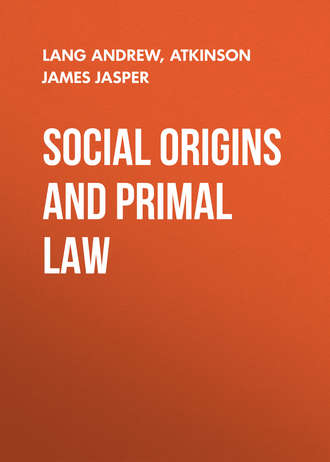
Lang Andrew
Social Origins and Primal Law
CHAPTER VI
FROM THE GROUP TO THE TRIBE
Resemblance of semi-brutal group, at this stage, to actual savage tribe. – Resemblance merely superficial. – In this hypothetical semi-brutal group paternal incest survives. – Causes of its decline and extinction. – The Sire's widows in the group. – Arrival of outside suitors for them. – Brothers of wives of the group. – New comers barred from marital rights over their daughters. – Jealousy of their wives intervenes. – Value of sisters to be bartered for sisters of another group discovered. – Consequent resistance to incest of group sire. – Natural selection favours groups where resistance is successful. – Cousinage recognised in practice. – Intermarrying sets of cousins become phratries. – Exceptional cases of permitted incest in chiefs and kings. – No known trace of avoidance between father and daughter. – Progress had rendered such law superfluous.
A superficial view of the group we have examined might, from its general resemblance in custom to others among actual lower types of man, lead to a hasty conception of perfect identity, from a social point of view, in nearly all other respects. We see that exogamy, hostile capture, group marriage,291 and obedience to certain accepted rules of avoidance, are common to both, to the hypothetical semi-bestial and to the actual savage groups.
The impression, however, would be very erroneous.
In the former, the hypothetical archaic stage, still lurked as a festering canker, an archaic element in marital prerogative, which marks it as of an epoch in the life-history of our race when the brute still triumphed over the man, an epoch far removed from our own. It possessed a feature in connubial relations as between certain group members which placed a profound gulf between it and any existing form of these days – a trait which, whilst it endured, would tend to render all further social progress difficult, if not impossible. It barred the road to that next great gradation in sociological evolution which is implied in the friendly conjunction of groups in a tribe. The latter stage was a vast upward step, but still it was only one round in the ladder of ascent to man, and indeed derived its chief importance from this fact as such. The tribe was the real goal; there, only, could be found the vital quality of social stability to be conferred by peaceful connubium between united groups as opposed to hostile capture between isolated families. Each group must come to be in itself complete, and yet each must form the necessary complementary parts of the actual Tribe common to all lower races, with its typical divisional inter-marriageable group classes ['phratries']. The fatal bar to a higher platform was a heritage from the anthropoid ancestor, and, as such, eminently characteristic of an animal stage.
This odious inheritance was the habit of incest between father and daughter, which we have found to be common to all the mammalia as a dominant domestic feature. As a factor in evolution we have seen that it actually had as direct outcome the primal law itself, and thus, with a strange irony, it may be said to have so laid the foundation of an ultimate moral sense. In such or other action in the past it had, however, served its useful purpose. Its operation in the future could be but detrimental; so opposed to all advance does it become, that, as we shall find, it is to be finally swept aside so completely as to permit to some students doubts of its existence, though 'In Saturn's time such mixture was not held a crime.' Leaving no traces of action in actual usage save in such exceptions as prove the rule, it will not be difficult to show that, in giving birth to the primal law, it doomed its own existence, and this apart from any ethical connection. The continued progress of society led almost mechanically to developments eminently inimical to its continuance as a custom, whilst again it would be found even injurious to the order of things as constituted in the earliest group-plus-tribe stage. If we bear in mind the axiom that, other things being equal, the largest assemblage of individuals in amity would have the greatest chance of survival, as possessing more numerous units of strength, then father-and-daughter marriage would be pernicious by preventing an assembly from profiting to a full extent by the productive powers of all its members. For such incest implies sole marital rights by a senior generation of males over a junior generation of females. As the latter would always, from mere disparity of age, outlive the former, it follows that, on the death of a father the daughters would remain unproductive, the only other males in the family group being their own brothers, and as such barred to them by the primal law.
This situation, in itself an element of weakness, became doubly so, if, as is probable, these young widowed females seceded to other and hostile groups with whom union to them was free. Such groups would in consequence be by so much strengthened, at the expense of their original circle. If, on the other hand, these widows remained in their own circle, their presence as useless mouths would be embarrassing, and a possible source of danger as a temptation to outside suitors. Again, celibacy being quite an anomaly in such an era, complications might arise from possible infractions of the primal law itself within a group.
But it is in special relation to the further movement in advance implied in the friendly aggregation of groups into a tribe that the effects of paternal incest would be most fatally felt. For while it reigned as a custom and a father usurped sole marital right over the whole feminine element, the immigration into the group of outside suitors for their hands would be impossible, their possession by the latter would be only possible after capture, which, being hostile, would tend to keep asunder the different groups. And yet in the next and higher stage of social evolution, as presented in the amalgamation of groups into a tribe, the acceptation of these outside mates in peaceful connubium is precisely the most characteristic feature. In later days they will be found as the male members of a certain 'class' in one 'phratry,' and, de facto, eligible in group marriage with all and certain females of the corresponding category as regards birth in another phratry, within an all-embracing tribe. As indeed with actual Australians, where, by right of birth alone each 'class' contains the natural born husbands of the wives of another 'class.' Such connubium is evidently impossible while incest flourished as a custom, it could only arise after its decay.292
It thus becomes necessary to study by what possible conjunction of affairs so desirable a result was arrived at. We will find that, however fortuitous the event of the primary inclusion of an outside possible suitor within a group, however timid and hesitating his entry, his presence there would be the signal of the beginning of the end. Now it is evidently hopeless to look for any voluntary acceptance of his claims by the living father, to whom the temptation to so easy a procuring of an inmate of his harem as his own daughter would be irresistible. There would be also on his side all habit and tradition, and with no direct group interest in opposition, the brothers being unconcerned. The initiative in change must then arise irrespective of him, and without the obstacle of his presence. This could only be possible thus after his death.
Now it is important to observe that precisely the embarrassment we have seen arise after this event must be a means to the end of the conjunction we seek. We have noted the danger of the situation under such circumstances; ineligible in union by the primal law with the remaining male element, which is composed of their own brothers, temptations to its infraction would be as frequent as fatal, on the part of the early widowed sisters. On the other hand, the anomaly of a celibate existence in the animal stage would tend to the secession of widows, so to speak, to hostile hordes, or to constant attempts at hostile capture by the outside suitor. But with the friendly entry of the latter and his acceptance as a group member, all these disturbing influences would at once cease; further, the value of an extra unit of strength in his presence would soon make itself felt.
Let us then imagine a band of brothers willing to aid in the sustenance of their widowed sisters, strong enough to defy their capture by others, and determined to frustrate any attempt at escape on their part. The inevitable result would be the attraction within their own circle of suitors for their hands. Now it is worthy of note that the feasibility of the process of such attraction and inclusion becomes more obvious when we reflect that if, as is probable, they belonged to a neighbouring group, they would thus by no means find themselves quite strangers in their new home. For it is precisely from near neighbours that their wives would have been captured by the males of the assembly they have now joined. These wives, in fact, would be probably own sisters to the immigrants. As such, then, we can understand an easier tolerance of their presence by the resident males, their new brothers-in-law; as brothers and sisters the primal law created such a bar in division between their own wives and the new comers, as put aside any possible chance of friction in jealousy.
Now the significance of the entry of outside males would be vast, from many points of view. In a general sense we here find that further aggregation of numbers in unison which we considered important, as prophetic of the present social condition of to-day. Again, there arises a renewed distinction of that difference as between one female and another, so peculiar to mankind. For here we see that for the first time a sister no longer ranks in exactly the same line, from a marital point of view, as a mother. A daughter, in fact, may now evidently have as mate other than the husband-father. As the primitive mind habituated itself to this idea, the first serious blow was dealt at the old parental prerogative. Again, in other ways, in other minds than own brother and sister, will this change in the old order of things be thus brought home – to no one more clearly than to the outside suitor himself, when, later, he becomes a father; the trains of circumstances leading to it are very curious, but would arise in a perfectly natural manner. The result in this connection would make itself felt by him in the next generation, with the advent to the adult stage of his own female offspring.
Is it credible, indeed, that the original male members of a group who had solely accepted his entry as mate for those ineligible females, their sisters, would consent to his further participation in marital right with other female group members? Evidently not: for thus the sexual prerogatives of the strangers would be much greater than their own – for the resident males are barred by the primal law from the wives of the new comers, who yet, as resident females, form probably much the most numerous section of the feminine element in the horde. If the new comers further inherited the ordinary right of intercourse with their own daughters, who would be correspondingly numerous, then the extent of their rights would entirely outbalance that of their brothers-in-law. As original residents the latter would, however, be the law-makers, and we can have no doubt as to what form in such a case law would take.293 Thus is struck a blow again, however indirect, to incest as a custom, a blow whose power would be the more effective, insomuch as here it is the living father himself, in the outside suitor, who would be in cause. But even admitting that it is possible to conceive a complacency in regard to such participation in sexual rights on the part of the brother, there would still be another much more formidable obstacle to incestuous license as regards his daughter confronting the male intruder in the person of the precedent sister, now his wife.
A psychological factor of enormous power was now for the first time in the history of the world to make itself felt. It would be the play of the natural feeling of sexual jealousy on the part of his resident female mate. The jealousy of a woman, in fact, is at length able to make its strength appear, to some purpose. As a wife who had not been captured, who, in fact, as an actual member of the group itself, was, so to speak, the capturer, her position in regard to her dependent husband would be profoundly modified in comparison with that of the ordinary captive female. Whereas such a captive, seized by the usual process of hostile capture, had been a mere chattel utterly without power; she, as a free agent in her own home, with her will backed by that of her brothers, could impose law on her subject spouse, and such law dictated by jealousy would undoubtedly ordain a bar to intercourse between him and her more youthful, and hence more attractive, daughter.
By these then, and other incidents, each of vast value, we may perceive how the primitive mind became gradually prepared for a change so imperatively necessary for all future progress, and how a habit even so deeply ingrafted as incest may primarily have been forced to slacken its hold. It is even possible to imagine how from such a point of departure, the custom might at once have entirely ceased among all, or at least a portion of, mankind. If we could conceive at this stage a secession from their original group of its resident component females, accompanied by their outside mates, with a continuance of the acceptance of the subordinate strange suitors in future generations of the new colony, then we could admit the probability of rapid evolution in approach to a well-known actual group formation. The persistent importation of the always dependent outsider would accentuate the movement already begun against incest – with two such associations in unison, cousinship would be recognised, and peaceful connubium in 'cross-cousin' marriage between groups would become a habit, and female descent the rule.294 But at such a stage in social evolution, it is impossible to accept the dominance of the unsupported female or 'feme sole.' Gynæcocracy, if it has indeed ever existed, is evidently as yet incredible. Not thus was dealt the final fatal blow at this last great trait of archaism. We must rather seek it in the familiar economy of the type of group we have left, which is characterised, as with other animals, by the predominance of the male.
In our study of the various incidents in primitive social economy which would have had effect in a sense inimical to the custom of incest, we have only considered the matter from the point of view of the entry of the outside suitor after the death of the paternal tyrant. The incestuous rights of the living group-fathers are thereby in no way directly affected. In the absence of any direct personal interest in the matter on the part of the group-sons, the only other male components and law-makers might indeed continue to remain unopposed indefinitely. Thus a resolution of the problem of decay of incest would seem as far off as ever. Happily this is not in reality the case – the real significance of the entry of the outsider, even on such terms as we have examined, lay in the co-ordination of movement of these resultant primary checks, and the inevitable synchronous evolution of the most characteristic feature of the next and higher type of group, as in itself a mere component of a tribe. The outsider's admission, in fact, really contained the germ of progress in group formation which was to entail the total required decay [of incest].
Up to the present, although the entire male element in a group was divided into two classes, by generations whose interests had little in common, between them no antagonism had arisen which could not be appeased by the evolution of such a law in remedy as we have noted. The case would now be altered; an irreconcilable breach was about to divide them. It will be seen that the advent of the outsider had been a real portent. Where, for instance, and under the circumstances we have portrayed, he had become a more accustomed figure as an immigrant, he would form a valuable connecting link between groups. Each would certainly possess some females seized from the other by more or less forcible capture, but each now possessed a certain proportion of these males, brothers of those females, whose intrusion had been peaceably accepted. With less strained relations and greater intercourse, capture would become a little more rare, and a friendly interchange of women more common. There would be then discovered by the brother a hitherto undreamt-of virtue in the young female, his sister; in fact, her value as a negotiable article would appear.
As brothers and sisters, and thus barred in union by the primal law, their relative interest in each other had been of the feeblest in the past. The ultimate destiny of the sister might be a matter of the most perfect indifference to the brother. With the new order of things she had suddenly become more precious. As an object of barter for the sister of another man, she would show herself to be invaluable. In view of the difficulty and danger attending hostile capture, the temptation to such easy procuration of mates as sister-barter offered would be irresistible. Coming at first into practice when only the death of the father had left his widowed daughter free, its advantages to the sons would impose a gradual encroachment on the rights of possession by the living parent. In prejudice to incest were now opposed the two most powerful passions in human nature, sexual desire, and a love of material gain, and the successful barter of a sister for another man's sister satisfied both. For attempts at capture might be unsuccessful, and purchase might be more or less unsatisfactory. And these passions would be aroused in bosoms able to make their power felt. The sons, as also resident males, would be among the law-makers. However powerful the father in past authority and tradition, in the end the force of numbers would tell. However numerous the group of fathers, they would always be outnumbered by the group of brother sons, and victory would thus ultimately incline to these.295 However long and doubtful the struggle, as the latter possessed the longer lease of life, the quantum of the exchange value of a sister would always finally be made to show itself, and the determination to profit thereby would be more strongly impressed on each generation.
Natural selection would again certainly come into play in favour of such groups, thus curtailing the monstrous prerogatives of the old-world fathers, by dint of numbers alone. The superiority which would ensue with each generation, would speedily ensure the triumph of that assembly which could definitely accept the presence of the outside suitor. He would come as a multiple unit of strength, a willing ally who would otherwise have been an active enemy – the generator of the productive power to females who would either have remained as sterile residents, or seceded to hostile hordes as breeders of new foes.
Thus, then, we may at length perceive how a custom even so deeply ingrained in nascent man as paternal incest, may finally have become extinct as a custom. In the action of such circumstances we can accept the idea of its ultimate decay and death. By the numerical preponderance of the individuals within a group interested in its disappearance, was alone such a result feasible. This necessary condition we here find fulfilled.
In opposition to the father we now see arrayed not only the wife-mother jealous of her mate, not only the daughter inclined instinctively to youth and the unknown, but, most important of all, the son, now egged on by most powerful personal feelings and interests. And for these latter ones, as we have seen, time itself would fight; to youth each hour and day is a gain in strength, to old age each moment means a loss of power. With the decay of the custom we see that the way lies clear to progress in group formation. Sooner or later the presence of the offspring of the outside suitors in the formerly purely consanguine circle will be recognised, their recognition as cousins to the younger resident members will be made, and the old type of horde by a process of cleavage divides itself into two intermarriageable clans, (phratries?), and the savage tribe is created.296
Thus did the custom of paternal incest disappear, and so completely as not to leave a trace of its passage in recognised usage among actual peoples. But as an unauthorised habit it long existed, nay, it still lurks, and as such it is probably much more common among the lowest classes of even most civilised peoples than is generally imagined. The continual domiciliary propinquity of such close relatives makes the crime easy297 and detection difficult. Amidst the savage races, although rare, it is by no means unknown. It is not a crime by the laws of totem kinship with female descent, the daughter in such a case being always of the same totem as her mother, and thus theoretically eligible. The only bar is the classificatory system which, based on sequence in birth, forbids all connection between those of different generations. Thus this form of incest, when it does occur, in no way creates the utter horror which we find universal at any union between brother and sister. An old native chief whom I questioned on the matter certainly spat with disgust at the idea, but again, to my own knowledge, a case occurred where a girl bore a child to her own father, and when the fact was mentioned among the people, it only caused coarse laughter. It is true that in this case the culprit was a great chief – it is possible that there would have been more adverse comment if he had been a commoner. It is certain that the betrayal of the vested interests of the future husband (for in New Caledonia all children are betrothed at a very early age) would have been more resented in the latter case. But license in sexual intercourse within forbidden relationships seems everywhere the privilege of irresponsible rank, if we may judge by the Kalmuck proverb, 'Great folk and the beasts marry where they please.'
However, its occurrence in such cases may be traced to sources which show that here the exception proves the rule. Indeed, the fact of its occurring almost solely among the higher classes [as among the Incas], points clearly to a probable connection with an idea of pride of race, or a question of inheritance. Now we may note that with descent in the female line the right of direct succession to the paternal name, or place of power, or property, is not in the gift of a father. The only legal conveyers of the blood right within him are females in whose veins is to be found that same blood, i.e. his mother and sisters. However regal a personage his child by a foreign woman, it is cut off from that heritage, nor in connection with this offspring can pride of race find a place. Thus, then, we may understand how union, although illegal, with a sister was so frequent in, and even enjoined on, the royal race amidst certain peoples. The purity of the royal blood thus alone remained intact, and from a king was born a king. For it is a remarkable fact which must be more than a coincidence that amongst these very peoples, such as the ancient Egyptians, Persians, and Peruvians, whose rulers were addicted to the habit, female descent was the custom [?]. At least I am not personally acquainted with any exception to the rule. In consonance with this descent through females only and where any approach has been made to gynæcocracy, we shall expect to find that there would be only one legal wife. Such was indeed the case also in Ancient Egypt, there is no instance of two consorts given in any of the inscriptions. This fact, taken in connection with that which conduced to incestuous union under this form of descent, invites us to make a digression in a curious reflection, not however entirely foreign to our general theme. For the same effect as regards inheritance on the offspring which would be produced by union with a sister, would also occur in marriage with a daughter whose parents had been themselves brother and sister. Thus we may guess the lineage of the unknown mother of the great royal wife Nefer-ari, daughter and consort of the Pharaoh of the oppressive Rameses the Great. This daughter had, in fact, been probably chosen among others for wife precisely because her mother had herself been both his sister and his wife.298
We may now renew our affirmation that paternal incest as a custom, is no longer generally recognised anywhere. The primitive unquestioned marital right in incest is quite unknown. It has disappeared, and so completely have even traces of its past general occurrence faded, that doubts of the reality of the fact may be pardonably entertained. The question is of importance in connection with our thesis, for as may be seen the whole theory of the primal law is based on the idea of its primitive universal prevalence. We hope, however, to have shown the inherent possibility of the fact as being a habit common to all the mammalia – and it has seemed against reason to suppose that man's ancestor, whilst in the animal stage, would be an exception to so general a rule. Our further argument has adduced circumstances in favour of a final decay so complete that oblivion could not but follow.
Perhaps not the least remarkable fact to the anthropologist in connection with its life and death, is that only as between a father and a daughter, of all blood relationships, do we find no trace among actual peoples of any law in Avoidance. The fact is significant, as we may thus surmise that the process of decay was very long delayed, in fact to a time when such inchoate form of law as Avoidance had become an archaism, or until general progress had rendered any law unnecessary.






